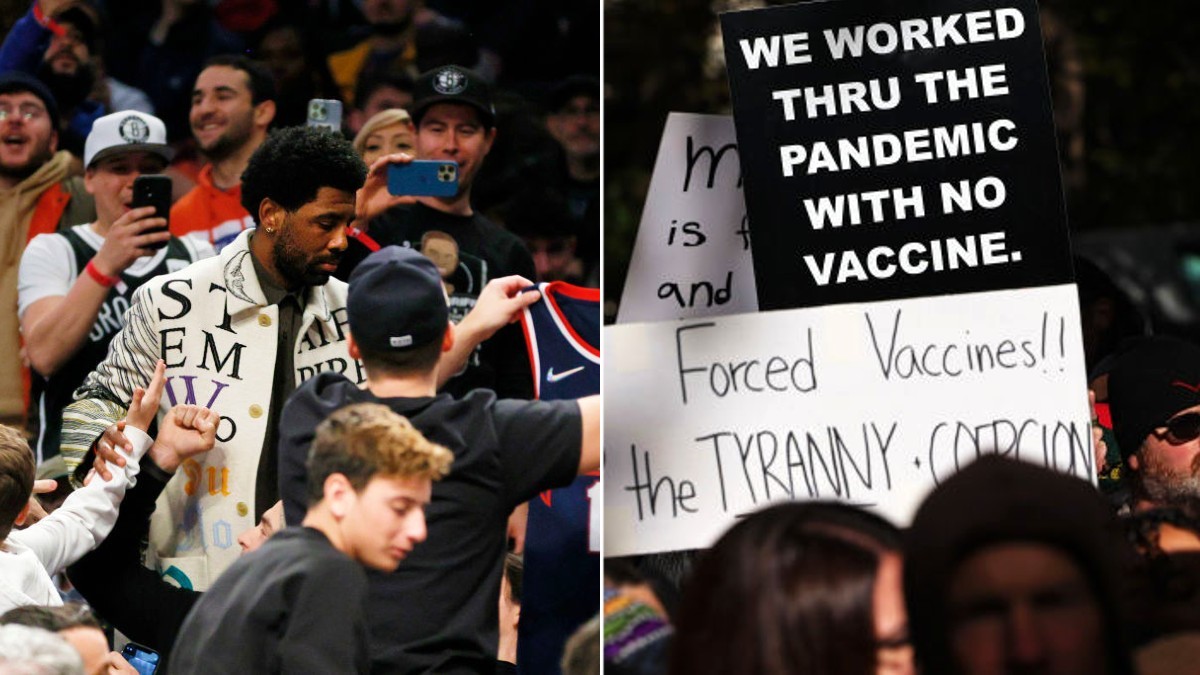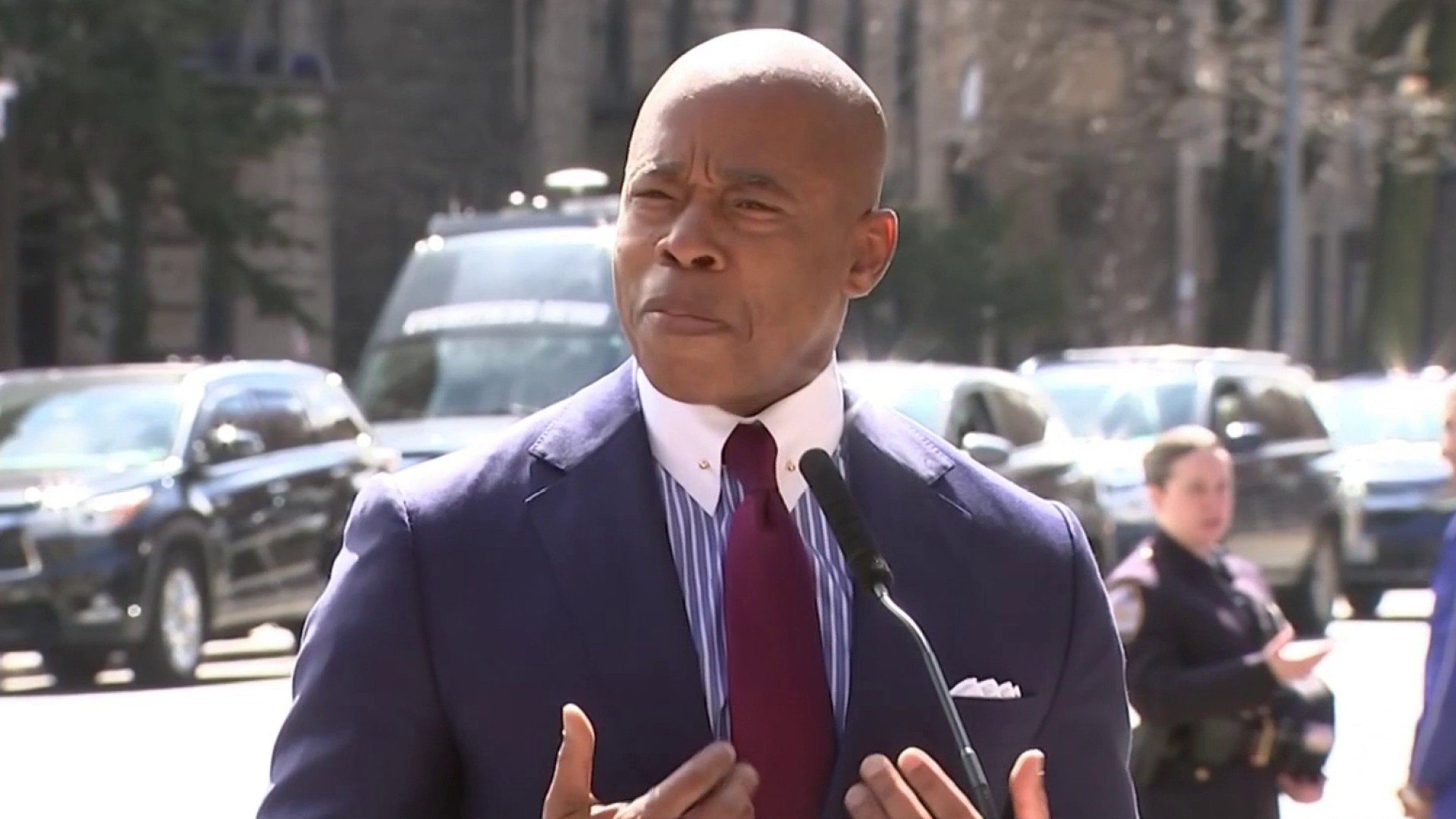What to Know
- Mayor Eric Adams signed an order exempting NYC-based performers from the private sector vaccine mandate while leaving the rule intact for the vast majority of private (and public) employees citywide
- Reports of the plan drew immediate backlash, with many calling it unfair that NYC workers remain suspended without pay while millionaire pros and entertainers have essentially gotten a pass
- Critics like union presidents for the FDNY and NYPD, city employees, and others representing private employees accuse the mayor of favoring "famous people" over the average NYC worker; Eric Adams says his decision was economically-based and it's time to move on
New York City Mayor Eric Adams is over the vaccine mandate controversy. And he says everyone else should be, too.
The Democrat on Monday sought in his sternest terms yet to end conversation over the still mounting backlash, declaring when asked about it at an unrelated briefing that, "The Kyrie story, the performers story, that's over."
"We're in this universe where Eric Adams' name and Kyrie Irving's name get a lot of clicks, that's fine," a defiant Adams said. "You do your job, I'll do my job. I'm not engaging in continuing questions on the same thing over and over again."
"I have a city to run, not staying in one place stretching out stories," he continued, calling out the media. "If you need a creative way to write this story, you'll have to do it without my participation. There are no more questions for Eric Adams to answer."
Those comments came when the mayor was asked if he planned to reinstate any of the 1,500 or so municipal employees who were terminated for refusing to comply with the vaccine requirement for city workers. It's not clear how many private-sector employees have lost their jobs for refusing to get their COVID-19 shots since that element of the mandate debuted under Adams' predecessor in late December.
Get Tri-state area news delivered to your inbox.> Sign up for NBC New York's News Headlines newsletter.
The backlash stems from Adams' decision -- an arbitrary and unfair one, as critics describe it -- last week to exempt New York City-based professional athletes and performers from the citywide mandate. In announcing the change Thursday, Adams argued the shift was in the city's best economic interest. Simply put, if elite players like, say, the Nets' Kyrie Irving, one of the most outspoken unvaccinated pros, can't play in home games, their teams' post-season chances could be at higher risk.
And if a given team's post-season chances are at risk, so too is that team's ability (and less directly, the city's ability) to cash in on the post-season. Since unvaccinated players from opposing teams are permitted to play in New York City, the mandate becomes a competitive disadvantage, Adams said.
He says he's leveling the playing field. Both the NBA and its union have expressed support for the change, while the presidents of the Yankees and Mets, whose unvaccinated players will be able to hit the field for their first home games in short order, both stood alongside Adams when he made the announcement at CitiField.
More than a few others, however, have called the shift a double standard or worse.
More Coverage
The heads of two firefighters unions in the city demanded a sitdown with the mayor on the issue as they called for a "one rule for all" approach to the vaccine mandate at a virtual weekend event. About 15 firefighters have lost their jobs and many more have opted for retirement because of the mandate, they said.
Firefighters Association President Andrew Ansbro, who estimates up to 500 firefighters remain unvaccinated and are at risk of losing their jobs with the city, evoked the mayor's point about changing science around COVID to make his own.
"If you're gonna force people to get vaccinated because the science changes, you also have to acknowledge that you're allowing people to have exceptions because the science changes and it's no longer necessary," Ansbro said.
Asked Monday about the sitdown request with the FDNY unions, Adams said he was open to listening to them, as he says he always is. But he remained firm.
"Everything is going to be in layers," Adams said of his COVID recovery approach. "I'm gonna roll out when my medical teams tell me what needs to be done and I will roll out according to that. So once we get those announcements, I'll announce them. Until then I'll do it in layers and continue to do it in layers."
It was that "peel-back-the-onion" approach that earned Adams a bit more controversy last week. He had been asked on Tuesday about potential changes to the private-sector vaccine mandate and said he had no plans to reevaluate it yet. He said baseball and basketball would have to wait; he needed more time.
Two days later, Adams announced the change. Questioned about the "wait," the Democrat said "two days is still a wait" and brushed off any criticism of his timing.
Adams has said the mandate change only applies to a "small number" of people, since most have complied with the mandate. He hasn't said how many -- and he continues to reiterate his belief that everyone should be vaccinated against COVID.
"We are simply making sure the rules apply equally to everyone who is a performer regardless of where they perform their craft," the mayor has said.
There has been discussion, though, that the shift could spark new legal challenges.
Jay Varma, a health adviser to former Mayor Bill de Blasio, who implemented the mandate in its original form, tweeted that the rule was able to stand in the courts because of its all-encompassing application.
"This mandate has always been about NYC employers. It had legal standing because [it] applied to all. The #Kyrie CarveOut opens City up to [the] entire scheme being voided by courts as 'arbitrary and capricious,'" Varma tweeted.
The latter two adjectives came directly from a statement issued by Police Benevolent Association President Patrick Lynch over the mayor's order.
"We have been suing the city for months over its arbitrary and capricious vaccine mandate — this is exactly what we are talking about. If the mandate isn’t necessary for famous people, then it’s not necessary for the cops who are protecting our city in the middle of a crime crisis," Lynch said.
"While celebrities were in lockdown, New York City police officers were on the street throughout the pandemic, working without adequate PPE and in many cases contracting and recovering from COVID themselves," he added. "They don’t deserve to be treated like second-class citizens now."



